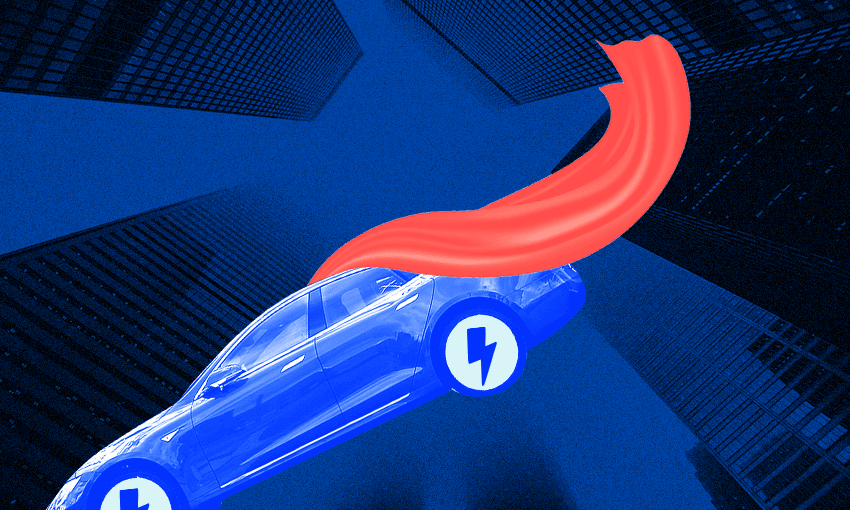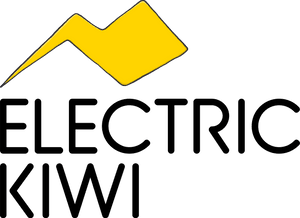Range anxiety, charging station locations and increasing power bills – there’s a lot to think about when transitioning to an electric vehicle. Electric Kiwi has a grand plan to ease those concerns.
This time last year, my family was considering buying a new car. We spent our evenings poring over spreadsheets, excel charts and Google Maps. We spent hours browsing motoring forums, watching YouTube reviews and listening to car podcasts. On weekends, we’d go for lengthy test drives, debating the merits of each and every vehicle, driving some two or three times.
We did all this because we wanted to buy an electric vehicle. Climate change was one reason, so was lowering our weekly petrol bill in the face of soaring price rises. Before we made our decision on which one to get, we had questions that needed answering. How many kilometres did we drive on an average day? How long would charging an electric vehicle take at home? How about using a public charger? Were chargers even available in the spots we visit the most? How much would we save on petrol, and how much more would we spend on power?
Phew. Buying an electric vehicle isn’t as simple as choosing a model and a colour. There are many things to factor in, including eligibility for the government’s rebate scheme, and supply chain issues that mean many customers have to wait months before their chosen vehicle lands in the country. Gone are the days you can walk onto a car yard and drive off with a new set of wheels.
This month, Electric Kiwi has revealed plans to help ease New Zealand’s transition from a petrol-powered fleet of cars to an electric-driven one by partnering with some of the leaders in EV technology, while offering customers a competitive time of use power plan to facilitate cheap off-peak charging.
“The pieces of the EV transition puzzle exist and are emerging, now it’s about making them fit together so Kiwis can make the switch with confidence,” says spokesperson Simon Downes. “For Electric Kiwi, it’s all about providing practical solutions to help power the green transition, and that’s what we’re doing with these partnerships and our MoveMaster energy plan.”
To do that, they’ve partnered with three like-minded companies also working towards a cleaner, greener future. Those include JOLT, which is unveiling the first of a range of free EV charging stations around the country this month, ChargeNet, New Zealand’s chief suppliers of out-of-home charging stations, and electric vehicle home charging solutions company Evnex.
The plan, says Downes, is to offer customers energy services that fit with their expanding needs – whether that’s a plug-in hybrid like our Mitsubishi Outlander PHEV, or a full electric vehicle, like a Tesla. “We’re trying to touch on every aspect of owning an electric vehicle. Not just by offering an awesome energy product for EV owners in MoveMaster, but by supporting and working with other companies helping to drive the technology behind the transition.”
To do that, they’ve pulled in some of the industry’s biggest players to offer discounts and coordinated payment plans.
Charge faster and easier at home
Ed Harvey was in his last year of university when he decided to take on a final-year project: converting his beat up 1997 Honda Accord into an electric vehicle. In 2012, people raised their eyebrows when he told them his car was powered by electricity. “It was one of only 200 electric vehicles in the country,” says Harvey. “It was quite unique to have an EV.”
A few years after leaving university, Harvey decided to throw his hat into the EV ring. He began his Christchurch-based company Evnex in 2014 with the aim of becoming the country’s biggest installer of smart EV chargers for home and small businesses.
It’s taken time, he admits. “There are still some people who are not supportive of electrification,” he says. “It’s definitely been a tough journey.”
Right now, though, that early investment is starting to pay off. Evnex chargers allow users to charge their EVs from home much faster, and his team of contractors have installed 2,500 chargers so far.
Things are picking up quickly this year: EVs made up just 4% of all cars sold from January-March, but that number increased to 10% over the July-September period.
“We’re seeing quite a steady increase in inquiries, which is fantastic,” says Harvey. “It’s been quite a long time coming to see EV demand pick up. We really feel like we’re there now.”
Working with Evnex, Electric Kiwi is offering customers money off their smart charger, as well as facilitating an interest-free loan to pay off the remaining balance.
Making away-from-home charging easy
Seven years ago, Steve and Dee West, went on a road trip in their new electric vehicle. They quickly realised one important thing: New Zealand was going to need a network of quick, reliable charging stations to support the transformation to electric-powered vehicles.
“They realised no one was doing that,” says ChargeNet spokesperson Bailey Gorst. So they decided to do it themselves. “They put their money where their mouth is.” Seven years ago, with just 500 electric vehicles on the road, the first ChargeNet public fast charger was installed. “We started well and truly before electric vehicles were a mainstream thing.”
Now ChargeNet prides itself on being New Zealand’s “nationwide charging network,” says Gorst, with 280 fast charge points covering the entire country. “From Cape Reinga all the way down to Bluff,” she says.
ChargeNet works like this. Users create an account and download an app (those without a phone can request an electronic fob instead). Charging costs are billed directly to a credit or debit card, but customers who pair their ChargeNet account with their Electric Kiwi account will be billed monthly, meaning all their energy requirements will be conveniently in one place.
The average charge time is around 30 minutes, and Gorst says their chargers are installed in places where people can go shopping or grab a coffee while they wait, giving them an experience as close to using a petrol station as possible. They’re busy adding even more chargers to their sites so wait times are lowered and charging times are improved.
Gorst agrees buying an electric vehicle can be more complicated than buying a petrol car, and hears stories like my family’s all the time. But as she watches EV ownership rates soar (“every month is the best month,” she says), ChargeNet’s usage is also increasing.
“People are used to petrol – it’s easy,” she says. “It’s second nature. We don’t question that. When we invest in a new EV, you need a good understanding of what you’re getting into.” She points out my kids will never need to do that. “It will just be second nature to them.”
Electric Kiwi customers will soon be able to defer the cost of charging their vehicles on the ChargeNet network until their next power bill, providing a single invoice for all their EV charging costs.
JOLT wants to electrify New Zealand’s EV network
You can’t see them yet – but soon you won’t be able to miss them. “We’re very slick and very visible,” says Chris Monaghan. “We’ll have screens on the roadside and chargers in the carpark.”
That, says the New Zealand manager of JOLT, an EV charging network, is important. With much of New Zealand’s EV infrastructure hidden in random car parks or on quiet roads that require an app to find them, seeing chargers everywhere they go “gives drivers confidence that there is infrastructure to support them making the transition to an electric vehicle.”
JOLT has plans to electrify New Zealand’s EV network. Starting this week with a site in Mitre 10 on Auckland’s Ponsonby Road, it has unveiled plans to build 500 charging stations around the country over the next five years. They will be in destination areas, says Monaghan. That means you’ll find them in gyms, retail stores and swimming pools. “It’s a top-up opportunity.”
JOLT’s chargers are free to begin with. “You get seven kilowatts free (about 50km worth of charge) then you pay 50 cents a kilowatt, which is significantly better than anything else in the market,” says Monaghan. Customers use an app and a QR code to begin charging, and the digital display board on Jolt’s chargers will display advertising as a secondary income source.
Downes says “We’re proud to be supporting JOLT to get free EV charging in the wild off the ground here in New Zealand. We are yet to really see what a world of majority EV ownership is going to look like, but free destination charging points like JOLT are certainly going to be a part of it.”
Despite the initial stress that buying an EV caused us, we have no regrets about our decision. We rarely use petrol during the week, and it’s only on super busy weekends – or when we venture out of Auckland – that we have to turn to fossil fuels for our transport. Anything that makes that process easier, whether it’s wider access to chargers, cheaper and faster home charging or free charging in the wild at up to 7kWh per day has got to be a good thing.

